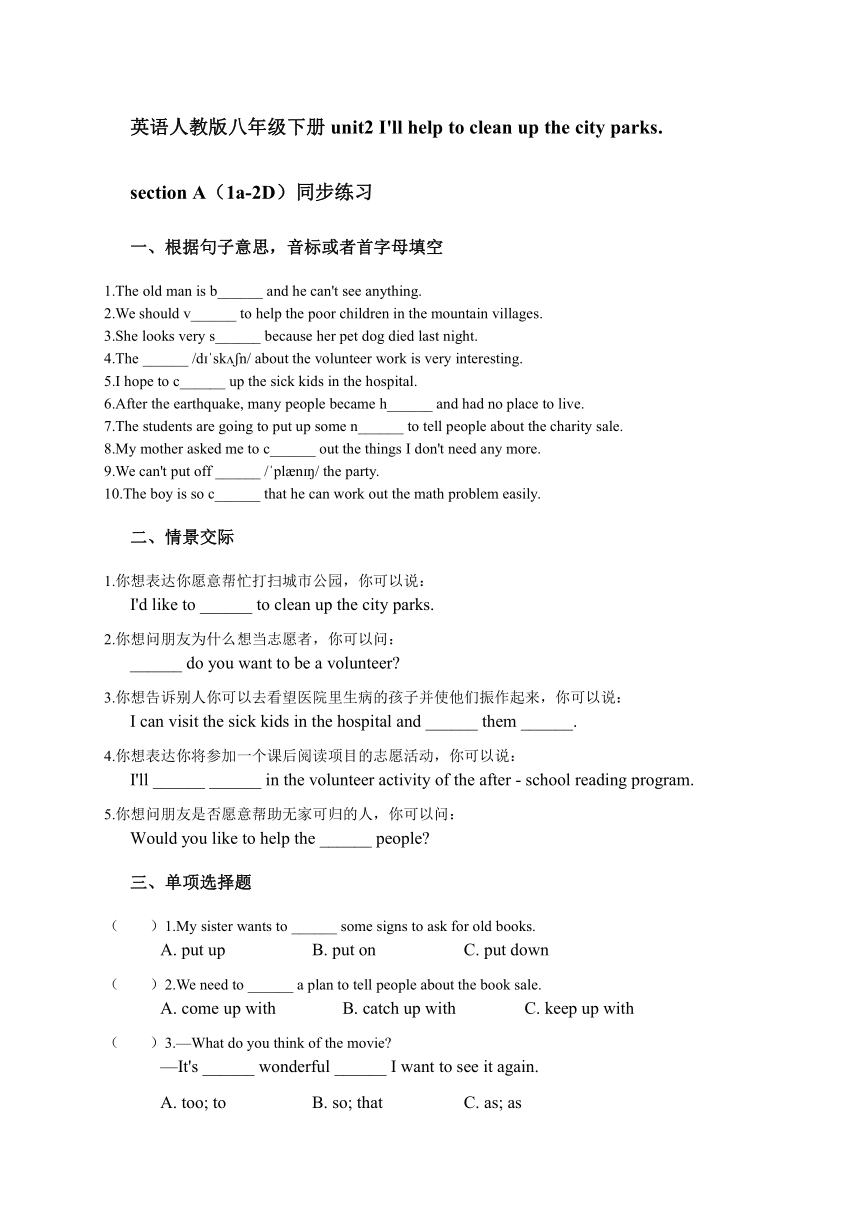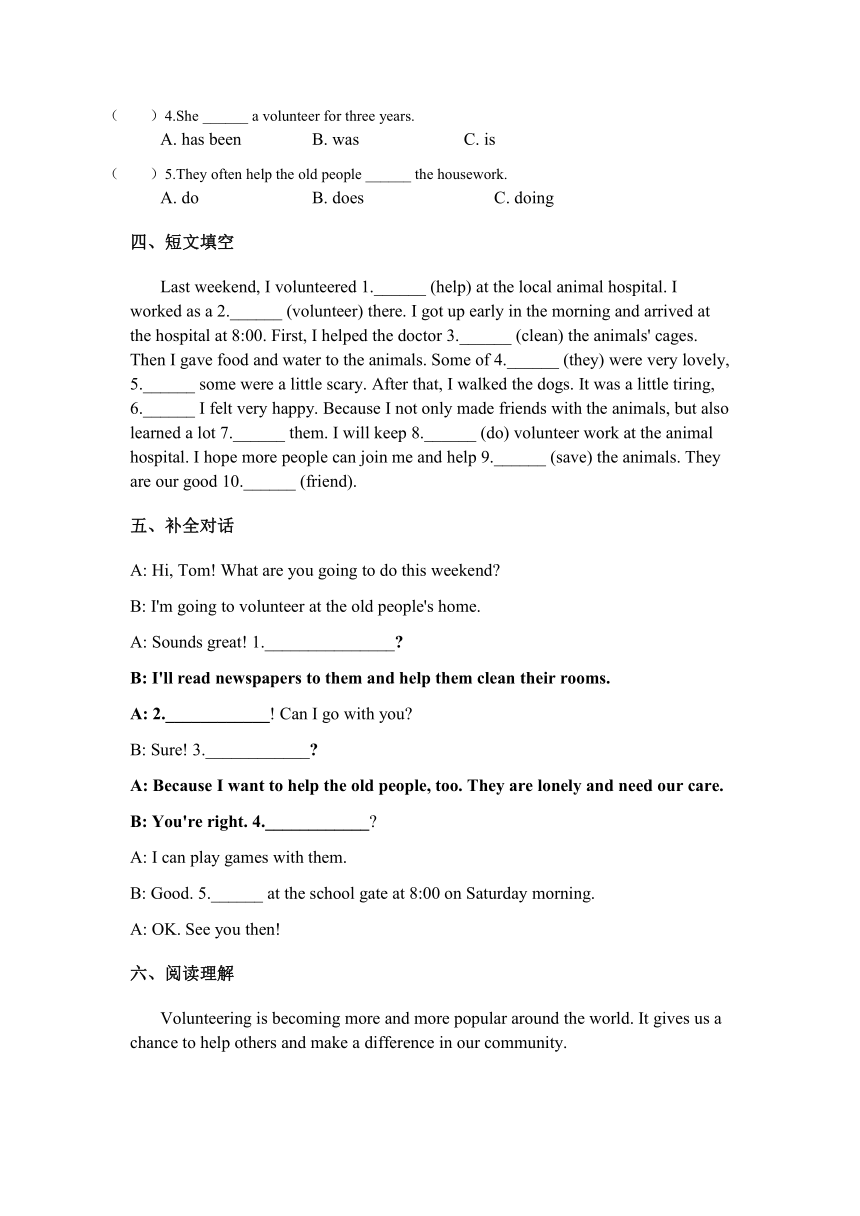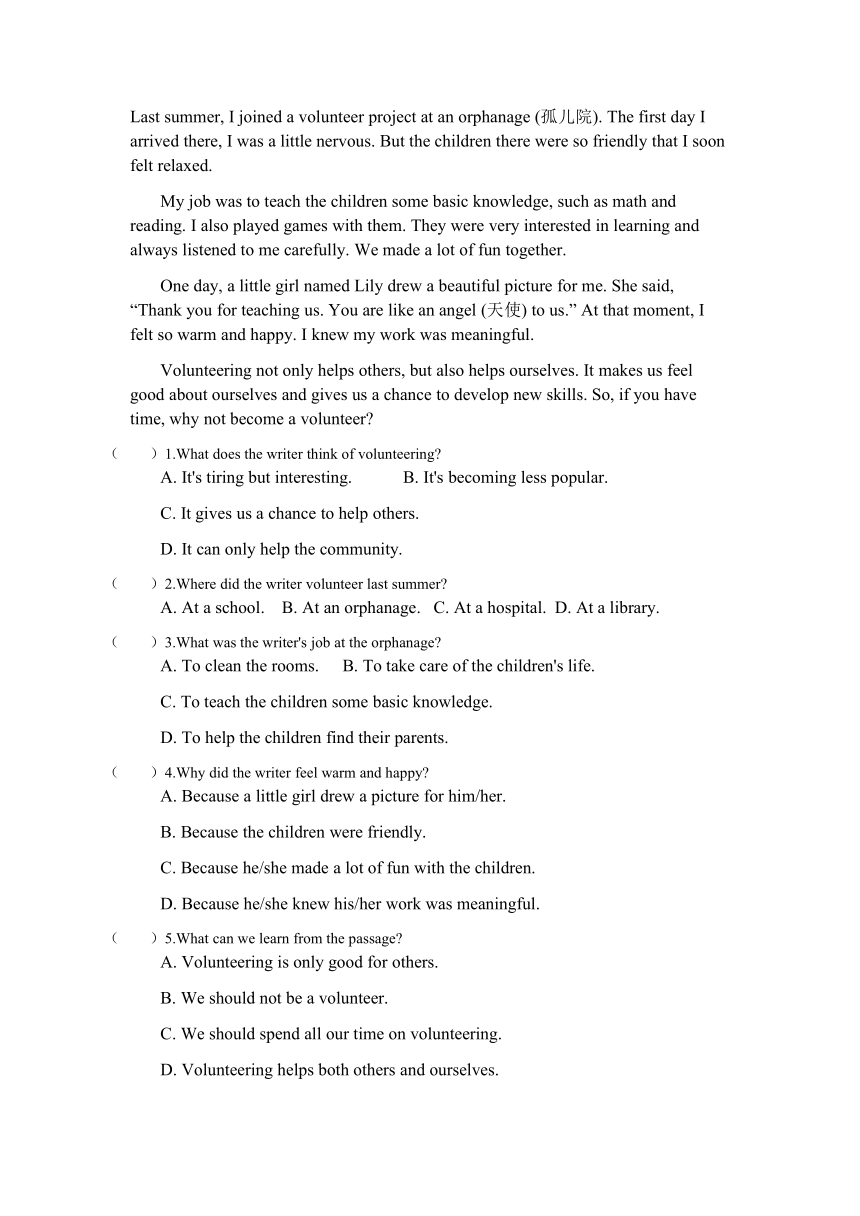Unit 2I'll help to clean up the city parks. SectionA(1a-2d)同步练习(含答案) 人教版八年级下册
文档属性
| 名称 | Unit 2I'll help to clean up the city parks. SectionA(1a-2d)同步练习(含答案) 人教版八年级下册 |

|
|
| 格式 | docx | ||
| 文件大小 | 24.8KB | ||
| 资源类型 | 教案 | ||
| 版本资源 | 人教新目标(Go for it)版 | ||
| 科目 | 英语 | ||
| 更新时间 | 2025-02-17 00:00:00 | ||
图片预览



文档简介
英语人教版八年级下册unit2 I'll help to clean up the city parks.
section A(1a-2D)同步练习
一、根据句子意思,音标或者首字母填空
1.The old man is b______ and he can't see anything.
2.We should v______ to help the poor children in the mountain villages.
3.She looks very s______ because her pet dog died last night.
4.The ______ /d sk n/ about the volunteer work is very interesting.
5.I hope to c______ up the sick kids in the hospital.
6.After the earthquake, many people became h______ and had no place to live.
7.The students are going to put up some n______ to tell people about the charity sale.
8.My mother asked me to c______ out the things I don't need any more.
9.We can't put off ______ / pl n / the party.
10.The boy is so c______ that he can work out the math problem easily.
二、情景交际
1.你想表达你愿意帮忙打扫城市公园,你可以说:
I'd like to ______ to clean up the city parks.
2.你想问朋友为什么想当志愿者,你可以问:
______ do you want to be a volunteer
3.你想告诉别人你可以去看望医院里生病的孩子并使他们振作起来,你可以说:
I can visit the sick kids in the hospital and ______ them ______.
4.你想表达你将参加一个课后阅读项目的志愿活动,你可以说:
I'll ______ ______ in the volunteer activity of the after - school reading program.
5.你想问朋友是否愿意帮助无家可归的人,你可以问:
Would you like to help the ______ people
三、单项选择题
( )1.My sister wants to ______ some signs to ask for old books.
A. put up B. put on C. put down
( )2.We need to ______ a plan to tell people about the book sale.
A. come up with B. catch up with C. keep up with
( )3.—What do you think of the movie
—It's ______ wonderful ______ I want to see it again.
A. too; to B. so; that C. as; as
( )4.She ______ a volunteer for three years.
A. has been B. was C. is
( )5.They often help the old people ______ the housework.
A. do B. does C. doing
四、短文填空
Last weekend, I volunteered 1.______ (help) at the local animal hospital. I worked as a 2.______ (volunteer) there. I got up early in the morning and arrived at the hospital at 8:00. First, I helped the doctor 3.______ (clean) the animals' cages. Then I gave food and water to the animals. Some of 4.______ (they) were very lovely, 5.______ some were a little scary. After that, I walked the dogs. It was a little tiring, 6.______ I felt very happy. Because I not only made friends with the animals, but also learned a lot 7.______ them. I will keep 8.______ (do) volunteer work at the animal hospital. I hope more people can join me and help 9.______ (save) the animals. They are our good 10.______ (friend).
五、补全对话
A: Hi, Tom! What are you going to do this weekend
B: I'm going to volunteer at the old people's home.
A: Sounds great! 1._______________
B: I'll read newspapers to them and help them clean their rooms.
A: 2.____________! Can I go with you
B: Sure! 3.____________
A: Because I want to help the old people, too. They are lonely and need our care.
B: You're right. 4.____________
A: I can play games with them.
B: Good. 5.______ at the school gate at 8:00 on Saturday morning.
A: OK. See you then!
六、阅读理解
Volunteering is becoming more and more popular around the world. It gives us a chance to help others and make a difference in our community.
Last summer, I joined a volunteer project at an orphanage (孤儿院). The first day I arrived there, I was a little nervous. But the children there were so friendly that I soon felt relaxed.
My job was to teach the children some basic knowledge, such as math and reading. I also played games with them. They were very interested in learning and always listened to me carefully. We made a lot of fun together.
One day, a little girl named Lily drew a beautiful picture for me. She said, “Thank you for teaching us. You are like an angel (天使) to us.” At that moment, I felt so warm and happy. I knew my work was meaningful.
Volunteering not only helps others, but also helps ourselves. It makes us feel good about ourselves and gives us a chance to develop new skills. So, if you have time, why not become a volunteer
( )1.What does the writer think of volunteering
A. It's tiring but interesting. B. It's becoming less popular.
C. It gives us a chance to help others.
D. It can only help the community.
( )2.Where did the writer volunteer last summer
A. At a school. B. At an orphanage. C. At a hospital. D. At a library.
( )3.What was the writer's job at the orphanage
A. To clean the rooms. B. To take care of the children's life.
C. To teach the children some basic knowledge.
D. To help the children find their parents.
( )4.Why did the writer feel warm and happy
A. Because a little girl drew a picture for him/her.
B. Because the children were friendly.
C. Because he/she made a lot of fun with the children.
D. Because he/she knew his/her work was meaningful.
( )5.What can we learn from the passage
A. Volunteering is only good for others.
B. We should not be a volunteer.
C. We should spend all our time on volunteering.
D. Volunteering helps both others and ourselves.
英语人教版八年级下册第 2 单元 unit2 I'll help to clean up the city parks.section A(1a-2D)同步练习答案
一、根据句子意思,音标或者首字母填空
blind:根据 “he can't see anything” 可知老人是失明的,故填 blind。
volunteer:should 是情态动词,后接动词原形,根据 “to help the poor children in the mountain villages” 可知是自愿去帮助,填 volunteer。
sad:根据 “her pet dog died last night” 可知她看起来很伤心,look 是系动词,后接形容词 sad。
discussion:音标 /d sk n / 对应的单词是 discussion,意为讨论。
cheer:cheer up 表示使振作起来,hope to do sth. 表示希望做某事,所以填 cheer。
homeless:根据 “had no place to live” 可知许多人变得无家可归,填 homeless。
notices:put up some notices 表示张贴一些通知,notice 是可数名词,这里用复数 notices。
clear:clear out 表示清理,ask sb. to do sth. 表示让某人做某事,所以填 clear。
planning:put off doing sth. 表示推迟做某事,所以填 planning。
clever:根据 “he can work out the math problem easily” 可知男孩很聪明,填 clever。
二、情景交际
help:“想要帮忙做某事” 用 “would like to help to do sth.” 。
Why:询问原因用 Why。
cheer; up:“使某人振作起来” 是 “cheer sb. up” 。
take part:“参加” 用 “take part in” 。
homeless:“无家可归的” 是 homeless。
三、单项选择题
A:“put up” 表示张贴;“put on” 表示穿上;“put down” 表示放下。这里是张贴标志,选 A。
A:“come up with” 表示想出;“catch up with” 表示赶上;“keep up with” 表示跟上。想出一个计划用 come up with,选 A。
B:“too... to...” 表示太…… 而不能……;“so... that...” 表示如此…… 以至于……;“as... as...” 表示和…… 一样。这里表示电影如此精彩以至于想再看一次,选 B。
A:“for three years” 是现在完成时的标志,其结构是 “have/has + 过去分词”,主语是 she,用 has been,选 A。
A:“help sb. do sth.” 表示帮助某人做某事,选 A。
四、短文填空
to help:volunteer to do sth. 表示自愿做某事。
volunteer:“a” 后接可数名词单数,这里表示作为一名志愿者,填 volunteer。
(to) clean:help sb. (to) do sth. 表示帮助某人做某事。
them:of 是介词,后接人称代词宾格,they 的宾格是 them。
but:前后句是转折关系,一些很可爱,但是一些有点吓人,用 but。
but:“有点累” 和 “感觉很开心” 是转折关系,用 but。
from:learn from 表示向…… 学习。
doing:keep doing sth. 表示持续做某事。
(to) save:help (to) do sth. 表示帮助做某事。
friends:主语是 they,“friend” 要用复数 friends。
五、补全对话
What will you do there:根据回答可知是问在养老院做什么,用一般将来时。
That's great:对对方的行为表示赞赏,说 “那很棒” 。
Why do you want to go with me:根据回答 “Because...” 可知是问为什么想一起去。
What can you do:根据回答 “我可以和他们玩游戏” 可知是问能做什么。
Let's meet:表示约定见面,用 “Let's do sth.” 结构。
六、阅读理解
C:根据 “Volunteering is becoming more and more popular around the world. It gives us a chance to help others and make a difference in our community.” 可知选 C。
B:从 “Last summer, I joined a volunteer project at an orphanage” 可知选 B。
C:根据 “My job was to teach the children some basic knowledge, such as math and reading.” 可知选 C。
D:根据 “At that moment, I felt so warm and happy. I knew my work was meaningful.” 可知选 D。
D:根据 “Volunteering not only helps others, but also helps ourselves.” 可知选 D。
section A(1a-2D)同步练习
一、根据句子意思,音标或者首字母填空
1.The old man is b______ and he can't see anything.
2.We should v______ to help the poor children in the mountain villages.
3.She looks very s______ because her pet dog died last night.
4.The ______ /d sk n/ about the volunteer work is very interesting.
5.I hope to c______ up the sick kids in the hospital.
6.After the earthquake, many people became h______ and had no place to live.
7.The students are going to put up some n______ to tell people about the charity sale.
8.My mother asked me to c______ out the things I don't need any more.
9.We can't put off ______ / pl n / the party.
10.The boy is so c______ that he can work out the math problem easily.
二、情景交际
1.你想表达你愿意帮忙打扫城市公园,你可以说:
I'd like to ______ to clean up the city parks.
2.你想问朋友为什么想当志愿者,你可以问:
______ do you want to be a volunteer
3.你想告诉别人你可以去看望医院里生病的孩子并使他们振作起来,你可以说:
I can visit the sick kids in the hospital and ______ them ______.
4.你想表达你将参加一个课后阅读项目的志愿活动,你可以说:
I'll ______ ______ in the volunteer activity of the after - school reading program.
5.你想问朋友是否愿意帮助无家可归的人,你可以问:
Would you like to help the ______ people
三、单项选择题
( )1.My sister wants to ______ some signs to ask for old books.
A. put up B. put on C. put down
( )2.We need to ______ a plan to tell people about the book sale.
A. come up with B. catch up with C. keep up with
( )3.—What do you think of the movie
—It's ______ wonderful ______ I want to see it again.
A. too; to B. so; that C. as; as
( )4.She ______ a volunteer for three years.
A. has been B. was C. is
( )5.They often help the old people ______ the housework.
A. do B. does C. doing
四、短文填空
Last weekend, I volunteered 1.______ (help) at the local animal hospital. I worked as a 2.______ (volunteer) there. I got up early in the morning and arrived at the hospital at 8:00. First, I helped the doctor 3.______ (clean) the animals' cages. Then I gave food and water to the animals. Some of 4.______ (they) were very lovely, 5.______ some were a little scary. After that, I walked the dogs. It was a little tiring, 6.______ I felt very happy. Because I not only made friends with the animals, but also learned a lot 7.______ them. I will keep 8.______ (do) volunteer work at the animal hospital. I hope more people can join me and help 9.______ (save) the animals. They are our good 10.______ (friend).
五、补全对话
A: Hi, Tom! What are you going to do this weekend
B: I'm going to volunteer at the old people's home.
A: Sounds great! 1._______________
B: I'll read newspapers to them and help them clean their rooms.
A: 2.____________! Can I go with you
B: Sure! 3.____________
A: Because I want to help the old people, too. They are lonely and need our care.
B: You're right. 4.____________
A: I can play games with them.
B: Good. 5.______ at the school gate at 8:00 on Saturday morning.
A: OK. See you then!
六、阅读理解
Volunteering is becoming more and more popular around the world. It gives us a chance to help others and make a difference in our community.
Last summer, I joined a volunteer project at an orphanage (孤儿院). The first day I arrived there, I was a little nervous. But the children there were so friendly that I soon felt relaxed.
My job was to teach the children some basic knowledge, such as math and reading. I also played games with them. They were very interested in learning and always listened to me carefully. We made a lot of fun together.
One day, a little girl named Lily drew a beautiful picture for me. She said, “Thank you for teaching us. You are like an angel (天使) to us.” At that moment, I felt so warm and happy. I knew my work was meaningful.
Volunteering not only helps others, but also helps ourselves. It makes us feel good about ourselves and gives us a chance to develop new skills. So, if you have time, why not become a volunteer
( )1.What does the writer think of volunteering
A. It's tiring but interesting. B. It's becoming less popular.
C. It gives us a chance to help others.
D. It can only help the community.
( )2.Where did the writer volunteer last summer
A. At a school. B. At an orphanage. C. At a hospital. D. At a library.
( )3.What was the writer's job at the orphanage
A. To clean the rooms. B. To take care of the children's life.
C. To teach the children some basic knowledge.
D. To help the children find their parents.
( )4.Why did the writer feel warm and happy
A. Because a little girl drew a picture for him/her.
B. Because the children were friendly.
C. Because he/she made a lot of fun with the children.
D. Because he/she knew his/her work was meaningful.
( )5.What can we learn from the passage
A. Volunteering is only good for others.
B. We should not be a volunteer.
C. We should spend all our time on volunteering.
D. Volunteering helps both others and ourselves.
英语人教版八年级下册第 2 单元 unit2 I'll help to clean up the city parks.section A(1a-2D)同步练习答案
一、根据句子意思,音标或者首字母填空
blind:根据 “he can't see anything” 可知老人是失明的,故填 blind。
volunteer:should 是情态动词,后接动词原形,根据 “to help the poor children in the mountain villages” 可知是自愿去帮助,填 volunteer。
sad:根据 “her pet dog died last night” 可知她看起来很伤心,look 是系动词,后接形容词 sad。
discussion:音标 /d sk n / 对应的单词是 discussion,意为讨论。
cheer:cheer up 表示使振作起来,hope to do sth. 表示希望做某事,所以填 cheer。
homeless:根据 “had no place to live” 可知许多人变得无家可归,填 homeless。
notices:put up some notices 表示张贴一些通知,notice 是可数名词,这里用复数 notices。
clear:clear out 表示清理,ask sb. to do sth. 表示让某人做某事,所以填 clear。
planning:put off doing sth. 表示推迟做某事,所以填 planning。
clever:根据 “he can work out the math problem easily” 可知男孩很聪明,填 clever。
二、情景交际
help:“想要帮忙做某事” 用 “would like to help to do sth.” 。
Why:询问原因用 Why。
cheer; up:“使某人振作起来” 是 “cheer sb. up” 。
take part:“参加” 用 “take part in” 。
homeless:“无家可归的” 是 homeless。
三、单项选择题
A:“put up” 表示张贴;“put on” 表示穿上;“put down” 表示放下。这里是张贴标志,选 A。
A:“come up with” 表示想出;“catch up with” 表示赶上;“keep up with” 表示跟上。想出一个计划用 come up with,选 A。
B:“too... to...” 表示太…… 而不能……;“so... that...” 表示如此…… 以至于……;“as... as...” 表示和…… 一样。这里表示电影如此精彩以至于想再看一次,选 B。
A:“for three years” 是现在完成时的标志,其结构是 “have/has + 过去分词”,主语是 she,用 has been,选 A。
A:“help sb. do sth.” 表示帮助某人做某事,选 A。
四、短文填空
to help:volunteer to do sth. 表示自愿做某事。
volunteer:“a” 后接可数名词单数,这里表示作为一名志愿者,填 volunteer。
(to) clean:help sb. (to) do sth. 表示帮助某人做某事。
them:of 是介词,后接人称代词宾格,they 的宾格是 them。
but:前后句是转折关系,一些很可爱,但是一些有点吓人,用 but。
but:“有点累” 和 “感觉很开心” 是转折关系,用 but。
from:learn from 表示向…… 学习。
doing:keep doing sth. 表示持续做某事。
(to) save:help (to) do sth. 表示帮助做某事。
friends:主语是 they,“friend” 要用复数 friends。
五、补全对话
What will you do there:根据回答可知是问在养老院做什么,用一般将来时。
That's great:对对方的行为表示赞赏,说 “那很棒” 。
Why do you want to go with me:根据回答 “Because...” 可知是问为什么想一起去。
What can you do:根据回答 “我可以和他们玩游戏” 可知是问能做什么。
Let's meet:表示约定见面,用 “Let's do sth.” 结构。
六、阅读理解
C:根据 “Volunteering is becoming more and more popular around the world. It gives us a chance to help others and make a difference in our community.” 可知选 C。
B:从 “Last summer, I joined a volunteer project at an orphanage” 可知选 B。
C:根据 “My job was to teach the children some basic knowledge, such as math and reading.” 可知选 C。
D:根据 “At that moment, I felt so warm and happy. I knew my work was meaningful.” 可知选 D。
D:根据 “Volunteering not only helps others, but also helps ourselves.” 可知选 D。
同课章节目录
- Unit 1 What's the matter?
- Section A
- Section B
- Unit 2 I'll help to clean up the city parks.
- Section A
- Section B
- Unit 3 Could you please clean your room?
- Section A
- Section B
- Unit 4 Why don't you talk to your parents?
- Section A
- Section B
- Unit 5 What were you doing when the rainstorm came
- Section A
- Section B
- Review of Units 1-5
- Unit 6 An old man tried to move the mountains.
- Section A
- Section B
- Unit 7 What's the highest mountain in the world?
- Section A
- Section B
- Unit 8 Have you read Treasure Island yet?
- Section A
- Section B
- Unit 9 Have you ever been to a museum?
- Section A
- Section B
- Unit 10 I've had this bike for three years.
- Section A
- Section B
